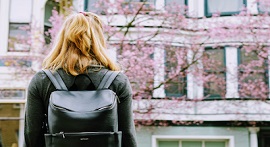Knox College is an independent-minded, uncannily smart four-year residential college. We're home to transformative teachers, classes, and learning opportunities, plus 1,200 brilliantly original human beings from everywhere on the planet. We believe that every experience is an education, that every new venture, every fantastic idea, every great journey, is human-powered. We also believe you learn the most from the people least like you. Knox is one of the 25 most diverse liberal arts colleges in America, with a campus community of 1,200 students from 45 states and 49 countries, including a wide array of races, ethnicities, ages, cultures, backgrounds, genders and gender identities, sexual orientations, and beliefs.
A Knox education is not something you sit and watch—it's something you do. Our students test their knowledge by applying theory to practice both in and out of the classroom. That can take the form of advanced research and creative work, internships, off-campus (sometimes way off-campus) programs, community service, or some combination of your own devising. We help make these experiences possible with a $2,000 Power of Experience Grant available to all incoming students during their junior and senior years.
These experiences, combined with opportunities to live and learn with students from different backgrounds, empower students to find success after Knox. Our students become engaged, innovative, and productive global citizens, ready to lead lives of purpose. They run Fortune 500 companies and grassroots nonprofits, they conduct major research at sites around the world, they found startups and music festivals, they see a human need and they meet it.
Our future is also rooted in our past. The commitment to put learning to use to accomplish both personal and social goals dates back to the founding of the College in 1837. We take particular pride in the College's early commitment to increase access to all qualified students of varied backgrounds, races, and conditions, regardless of financial means.
Today, we continue to expand that historic mission and the tradition of active liberal arts learning. We provide an environment where students and dedicated faculty work closely together and where teaching is characterized by inviting and expecting students to pursue fundamental questions in order to reach their own reflective but independent judgments. Our aim is to foster a lifelong love of learning and a sense of competence, confidence, and proportion that will enable us to live with purpose and to contribute to the well-being of others.
About
From the School
Contact & Visit
Campus Visits Contact
Visit Experience Coordinator
2 East South Street
Galesburg, IL 61401
Experience College Life
Gizmo (snack bar)
Andrew Fitness Center
Whitcomb Art Center
Umbeck Science and Math Center
Innkeeper's Coffee
Baked
Seminary Street (shops and restaurants)
Campus Tours
9:00 a.m.- 4:00 p.m.
800-678-KNOX
Dates: Year-round
Times: Acad yr, Mon-Fri 10:00 a.m.; 2:00 p.m.; Saturdays 10:00 a.m.
Average Length: 1 hour
On Campus Interview
Faculty and Coach Visits
Class Visits
Overnight Dorm Stays
Transportation
Admissions
Admissions
Overall
From The School
Knox seeks students who are active, engaged learners. We value students who demonstrate their appreciation for a variety of educational experiences, both in and out of the classroom. Our admission counselors consider you as an individual when making our admission decisions.
You can apply to Knox online via the Common Application. Deadlines for first-year admission are November 1 for Early Decision and Early Action I, December 1 for Early Action II, and January 15 for Regular Decision. We also accept transfer applications for fall, winter, and spring terms.
For more information, please visit admission online or contact us directly.
Office of Admission
Knox College
2 East South Street
Galesburg, Illinois 61401-4999
United States
Phone: 800-678-KNOX or 309-341-7100
Fax: 309-341-7070
E-mail: admission@knox.edu
Web: knox.edu
Overview
GPA Breakdown
Need to boost your grades? We can help.
Learn MoreSAT & ACT Test Scores
Testing Policies
Deadlines
Early Decision — November 1
Early Action — November 1
Regular — January 15
Other Admission Factors
Rigor of Secondary School Record
Academic GPA
Selectivity Rating
Get a personalized plan for a competitive application from an admissions expert.
Learn MoreAcademics
Academics
Overall
From The School
Academic Programs
Every Knox student will participate in some form of experiential learning before they graduate. All students receive a $2,000 Power of Experience Grant during their junior or senior year to support a qualifying experiential learning opportunity, including research or creative work, an internship, community service, or study abroad.
Our immersion terms allow students to focus on one topic (entrepreneurship, studio art, Japanese language and history, clinical psychology) for an entire term. They all provide hands-on experience—internships, research, travel, creative work. A few examples: In Green Oaks Term, students live at our biological field station, take interdisciplinary coursework in science, anthropology, and the arts, conduct research, and build a community. In Repertory Theatre Term, students research, design, produce, and perform two full-length plays—the most comprehensive undergraduate theatre experience in the country. The newest is StartUp Term, where students develop a business, coming up with a product, developing it, then pitching it to investors.
Knox has a longstanding (and pioneering) commitment to supporting advanced student research—intensive, long-term projects that go beyond coursework. The vast majority of our students (89%) produce research, independent studies, or creative work.
Half of our students study abroad, and our off-campus study programs—more than 80 in total—are designed to work with the Knox experience. You take what you've studied at Knox out into the world; you gather new information, new ideas, new experiences; and you come back with a new way of seeing yourself, your education, and your future.
Our career center helps students find meaningful professional experience by making the most of their education, resources, and connections to secure internships and postgraduate opportunities across the country and around the world.
Majors and Degrees Offered
Knox's program provides a balanced curriculum in the arts, humanities, sciences, and social sciences. Our 3-3 academic calendar—three terms (fall, winter, and spring), three courses per term—allows students to fully explore course subject matter and fulfill research expectations.
The College offers more than 60 courses of study, including an optional bachelor of science degree option in biochemistry, biology, chemistry, computer science, environmental science, mathematics, neuroscience, psychology, and physics. Many students double major; you can also design your own major. Choosing a major, and thinking broadly about the work you'll do in college and beyond, is in many ways a collaborative process, involving intensive conversations with peers, professors, counselors, and advisors (who are, in fact, professors).
Faculty and Class Information
Graduation Rates
Majors
-
AREA, ETHNIC, CULTURAL, GENDER, AND GROUP STUDIES.
African-American/Black Studies.
American/United States Studies/Civilization.
Asian Studies/Civilization.
Latin American Studies.
Women's Studies.
-
BIOLOGICAL AND BIOMEDICAL SCIENCES.
Biochemistry.
Biology/Biological Sciences, General.
Neuroscience.
-
BUSINESS, MANAGEMENT, MARKETING, AND RELATED SUPPORT SERVICES.
Business Administration and Management, General.
-
COMMUNICATION, JOURNALISM, AND RELATED PROGRAMS.
Journalism.
-
COMPUTER AND INFORMATION SCIENCES AND SUPPORT SERVICES.
Computer Science.
-
EDUCATION.
Education, General.
Elementary Education and Teaching.
Secondary Education and Teaching.
Teacher Education and Professional Development, Specific Subject Areas, Other.
-
ENGLISH LANGUAGE AND LITERATURE/LETTERS.
Creative Writing.
English Language and Literature, General.
-
FOREIGN LANGUAGES, LITERATURES, AND LINGUISTICS.
Classics and Classical Languages, Literatures, and Linguistics, General.
Foreign Languages and Literatures, General.
French Language and Literature.
German Language and Literature.
Spanish Language and Literature.
-
HISTORY.
History, General.
-
LIBERAL ARTS AND SCIENCES, GENERAL STUDIES AND HUMANITIES.
Liberal Arts and Sciences/Liberal Studies.
-
MATHEMATICS AND STATISTICS.
Mathematics, General.
-
MULTI/INTERDISCIPLINARY STUDIES.
Classical and Ancient Studies.
International/Global Studies.
-
NATURAL RESOURCES AND CONSERVATION.
Environmental Science.
Environmental Studies.
-
PHILOSOPHY AND RELIGIOUS STUDIES.
Philosophy.
-
PHYSICAL SCIENCES.
Chemistry, General.
Physics, General.
-
PSYCHOLOGY.
Research and Experimental Psychology, Other.
-
PUBLIC ADMINISTRATION AND SOCIAL SERVICE PROFESSIONS.
Public Policy Analysis, General.
-
SOCIAL SCIENCES.
Econometrics and Quantitative Economics.
International Relations and Affairs.
Political Science and Government, General.
Sociology and Anthropology.
-
VISUAL AND PERFORMING ARTS.
Art History, Criticism and Conservation.
Drama and Dramatics/Theatre Arts, General.
Fine/Studio Arts, General.
Music, General.
Students Say
Students appreciate that they are "academically challenged without fierce competition," though they admit that courses can be "tough and require a lot of time studying, reading, writing, and thinking." Don't plan to come to Knox "if you want to shy away from class discussion." Student opinions are taken seriously. Administration and faculty "not only encourage the students to take charge and make change, but they listen and act on the student body's opinions." In so doing, Knox succeeds in "staying in tune with its roots as a progressive and accessible institution."
Degrees
Career Services
Alumni Network
Alumni Services
Classes
Interest Inventory
Internships
Regional Alumni
Experiential
Internship
Prominent Alumni
Academic Rating
Careers
Graduation Rates
Career Services
Alumni Network
Alumni Services
Classes
Interest Inventory
Internships
Regional Alumni
Experiential
Internship
Tuition & Aid
Tuition & Aid
Overview
From The School
Tuition, Room, Board and Fees
Expenses per academic year:
Tuition: $49,185
Room: $5,040
Board: $5,130
Fees: $789
Total: $60,144
Average cost for books and supplies: $900
Financial Aid
Knox was founded on the idea that college should be accessible to people regardless of their financial means. We offer more than $40 million in financial aid every year. We're proud to offer a range of scholarships that recognize students' achievements in academics, arts, service and leadership.
For more information on scholarships or financial aid, visit knox.edu, or contact us at 800-678-KNOX.
Dates
Required Forms
Financial Aid Statistics
Expenses per Academic Year
Available Aid
Need-Based College/University Scholarship or Grant Aid from Institutional Funds
Need-Based Federal Pell
Need-Based Private Scholarships
Need-Based SEOG
Need-Based State Scholarships
Direct Subsidized Stafford Loans
Direct Unsubsidized Stafford Loans
Financial Aid Rating
Student Body
Student Body
Overall
From The School
Knox has an extraordinarily diverse, open-minded, and engaged student body. When we were founded, we were one of the first colleges in America to admit women and students of color. Today, we're more diverse in more ways than nearly any other college campus in the country. We learn from each other's experiences and perspectives, and it prepares us to be successful in a global, multicultural world—yet our community is still small enough that students develop meaningful relationships with professors and lifelong friendships with their classmates.
Student Organizations: The one quality that binds our 100+ student organizations is that they are all student-driven. Students create and run organizations in response to interests and needs. Some clubs focus on academic disciplines such as chemistry or physics. Others, such as Common Ground, Model United Nations, and Allied Blacks for Liberty and Equality focus on identity, culture, and politics. And, our successful club-level Ultimate Frisbee team and our music, dance, and performance ensembles provide an athletic and creative energy that characterizes Knox.
Intramural Clubs: More than half of our students participate in some kind of organized athletic activity, from club sports (water polo, ultimate frisbee, cricket); to intramurals (basketball, indoor soccer, softball, volleyball); to fitness classes organized and taught by students (a few recent examples: Balinese dancing, yoga).
Student Governance: Our student government actually governs. The Student Senate helps determine how funds from student activity fees are spent, makes student appointments to faculty committees, and serves as a forum for the debate of important issues on campus. Our students shape the future of Knox; their work is a lasting legacy.
Civic Engagement: We pride ourselves on being deeply engaged in the life of a strong, sustainable community—whether that community is local or global. Our students contribute tens of thousands of hours of service every year through established partnerships, special programs, and our KnoxCorps program. Knox was the first college or university in the country to offer an official Peace Corps Preparatory Program; we rank among the top producers of Peace Corps volunteers.
Student Body Profile
Demographics
Students Say
Campus Life
Campus Life
Overview
From The School
Location
Knox is located in Galesburg, Illinois (pop. 33,000), full of enterprising, big-hearted people. Galesburg was founded alongside Knox, surrounded by prairie and farmland. We are at the heart of a national rail network; there's an Amtrak station a few blocks from campus; Chicago (home to many Knox alumni) is three hours away. And two regional airports are less than an hour away.
The Knox campus consists of 90 acres located in the heart of Galesburg. While our campus is home to academic and administrative buildings, both historic and modern, residence halls, and athletic facilities, it also features wide-open spaces that provide beautiful prairie vistas and provides plenty of room for our Ultimate Frisbee team to practice alongside students studying on the lawn. Our own 700-acre Green Oaks Biological Field Station—one of the country's oldest prairie restoration sites—is 20 miles from campus.
And one last slightly esoteric note about this exact place: The land around us is fairly flat. No one lives high on a mountaintop or deep in a valley. There's something deeply democratic about this. We all have power. We all have a voice. We all stand on equal ground.
Campus Facilities & Equipment
House of Peace and Equity: The HOPE Center is where faith-based and cultural student organizations meet. Whatever your religion, nationality, race, ethnicity, sexual orientation, or gender identity, you belong there.
Libraries: Knox College maintains two libraries: Seymour Library and the Science-Mathematics Library, housing more than 350,000 volumes, as well as Special Collections & Archives, which contains primary source materials used by students, faculty, and researchers from around the world.
Arts: The Ford Center for the Fine Arts houses theatre, dance, and music and features the 600-seat Harbach theatre (with a 360-degree rotating stage), the 325-seat Kresge Recital Hall, the Studio Theatre, as well as dance and music studios. The Borzello Gallery in the Ford Center for Fine Arts is a space where students are trained in all facets of museum and gallery work, from curatorial research to the designing of didactics for exhibitions, and the physical design and installation of exhibits. Our new Whitcomb Art Center provides a state-of-the-art facility for students to study, create, and share their art.
Science: Knox is engaged in multi-year renovation of the Umbeck Science-Mathematics Center, the first phase of which was completed in 2020. The new facilities include technology-enabled teaching spaces and learning commons for interdisciplinary and collaborative study. The centerpiece of the new space is a 55-foot-long fin whale skeleton that was restored, assembled, and mounted for display by Knox faculty and students. Knox continues to expand an equipment roster that includes electron microscopes, NMR, ESR, GC-MS, other spectrometers and chromatographs, X-ray, laser labs, 3-D printers, experimental psychology labs, four computer labs, a rooftop observatory, and a greenhouse. Green Oaks Biological Field Station, about 20 miles east of campus, encompasses 700 acres of tallgrass prairie, old-growth oaks, second-growth oak-hickory forest, lakes, and streams.
Athletics: T. Fleming Fieldhouse provides an indoor six-lane 200-meter track and court space for numerous activities. Andrew Fitness Center offers separate cardio/weight machines and free-weight floors. Knosher Bowl, a true bowl stadium, features artificial turf and one of the best playing surfaces in Division III football. Blodgett Field is a pro-level baseball diamond, with special soil composition. Knox also maintains a main gym and basketball court, a six-lane outdoor track, softball and soccer fields, and a natatorium. Golf is played at a nearby private 18-hole course, supplemented with practice in the Schmid Golf Performance Center, a year-round practice facility with a video simulator and high-speed cameras.
Off-Campus Opportunities
There are opportunities both close to home and much, much farther away. Students can become an active part of the Galesburg community, taking part in service projects like Blessings in a Backpack and our groundbreaking KnoxCorps program (it's like the Peace Corps, if the Peace Corps sent volunteers to Galesburg, Illinois). They can also make art—as part of the Prairie Players Civic Theatre, the Knox-Rootabaga Jazz Festival, or the Knox-Galesburg Symphony Orchestra.
Knox's six-week winter break is often an ideal time for students to take what they've learned in the classroom out into the world. Knox offers an ever-changing array of courses that combine traditional classroom experiences with field work--marine biology in Belize, exploring London's history and culture, or art and dance in Cuba.
For students who want an extended off-campus experience, Knox offers study abroad programs in 80+ locations on six continents, many including internship or research components.
Campus Life
Housing Options
Disabled Student
Dorms Coed
Dorms Female
Frat Sorority
International Student
Theme Housing
Students Say
Special Needs Admissions
Documentation Required for LD
If academic accommodations are requested, disability documentation should be on official letterhead, signed (with credentials) and dated by an evaluator, generally a licensed psychologist or other professionals with experience and expertise in the disability. Documentation should indicate a diagnosis of a specific learning disorder. A diagnosis of a ?learning difference,? a ?learning weakness,? or other non-specific language does not meet the criteria of a disability. Learning disorders are listed in the DSM-V? as a disorder of written expression; mathematics disorder; learning disorder not otherwise specified; and reading disorder. Documentation should include relevant developmental, historical, and familial data of a specific learning disorder. Assessment instruments utilized to document this disability should address Aptitude (IQ), Achievement (reading, math and written language) and Processing (such as visual and auditory). Acceptable cognitive achievement and ability assessments which utilize adult normed tests are tests such as Wechsler Adult Intelligence Scale (WAIS-III) or Woodcock-Johnson (WJ-III). Screening tests, such as the Wide-Range Achievement Test (WRAT), the Nelson Denny Reading Test, or the Peabody Individual Achievement Test are not acceptable in and of themselves as tests of achievement. Relevant testing documentation should ideally have been conducted within the last three (3) years and include a summary of assessment procedures and evaluation instruments used to make the diagnosis, including evaluation results and standardized scores, if applicable. The report must specify the test scores or rationale used to determine the DSM-5 ? or ICD-10 diagnosis. Testing documentation should ideally include recommendations for academic accommodations and reflect a connection between the requested accommodation and the functional limitation on the student in the academic environment.Documentation Required for ADHD
If academic accommodations are requested, disability documentation should be on official letterhead, signed (with credentials) and dated by an evaluator, generally a licensed psychologist or other medical professionals with experience and expertise in the disability. The documentation is current, includes a diagnosis of the disability and relevant background social, emotional, and behavioral history. Testing documentation submitted should ideally have been conducted within the last three (3) years and include a summary of assessment procedures and evaluation instruments used to make the diagnosis, including evaluation results and standardized scores, if applicable. The report should specify the test scores or rationale used to determine the DSM-5 ? or ICD-10 diagnosis. Testing documentation should ideally include recommendations for academic accommodations and reflect a connection between the requested accommodation and the functional limitation on the student in the academic environment.Special Need Services Offered
Student Activities
Sports
Basketball
Cross Country
Diving
Football
Golf
Soccer
Swimming
Track Field Indoor
Track Field Outdoor
Cross Country
Diving
Golf
Soccer
Softball
Swimming
Track Field Indoor
Track Field Outdoor
Volleyball
Student Services
Sustainability
Data provided by Association for the Advancement of Sustainability in Higher Education (AASHE), STARS®, as of March, 2024.
Campus Security Report
The Jeanne Clery Act requires colleges and universities to disclose their security policies, keep a public crime log, publish an annual crime report and provide timely warnings to students and campus employees about a crime posing an immediate or ongoing threat to students and campus employees.
Please visit The Princeton Review’s page on campus safety for additional resources: http://www.princetonreview.com/safety
The Princeton Review publishes links directly to each school's Campus Security Reports where available. Applicants can also access all school-specific campus safety information using the Campus Safety and Security Data Analysis Cutting Tool provided by the Office of Postsecondary Education of the U.S. Department of Education: https://ope.ed.gov/campussafety/#/
Other Information
Wellness Program/Clinical Offerings
Education & Training
Available for faculty & staff;



















